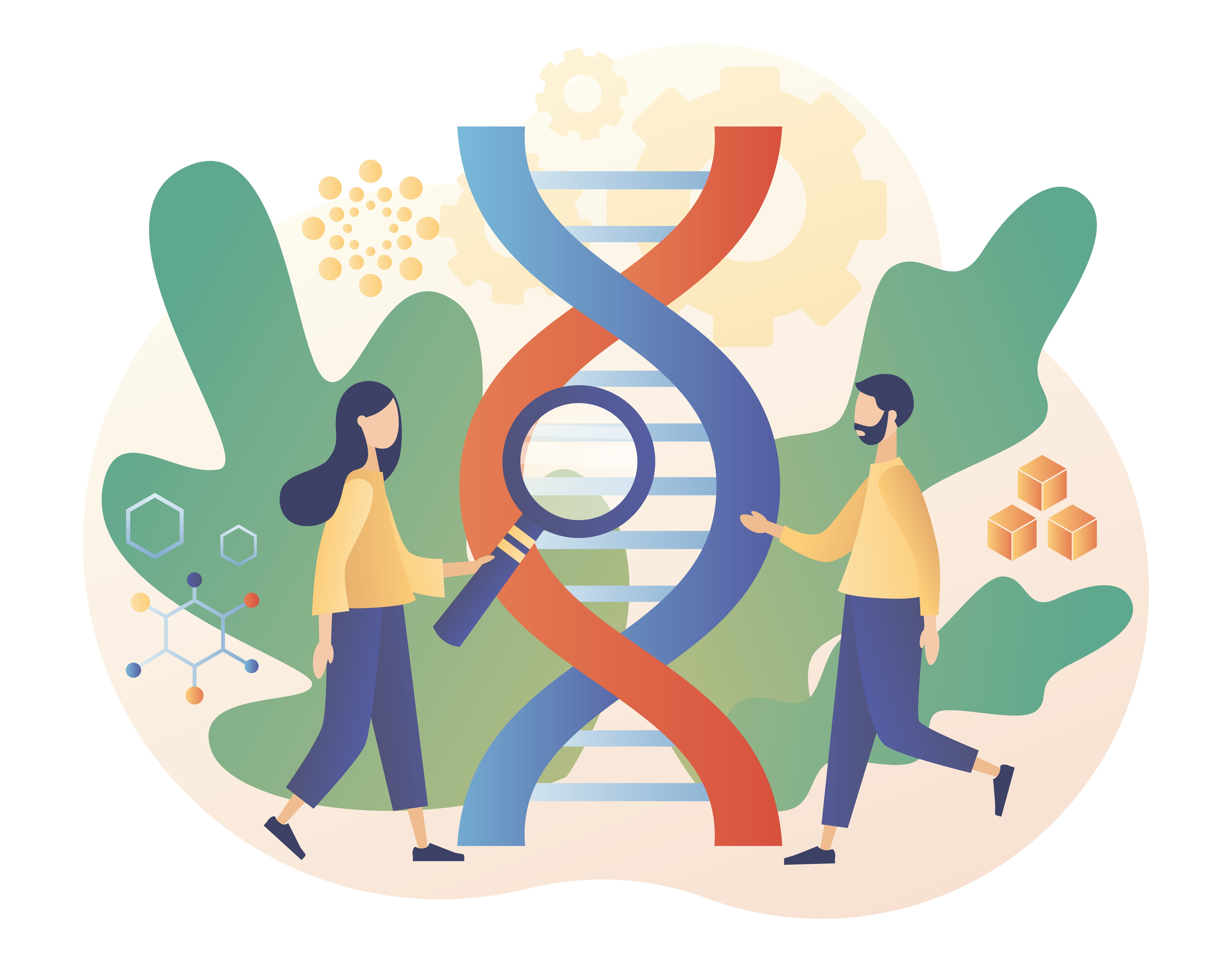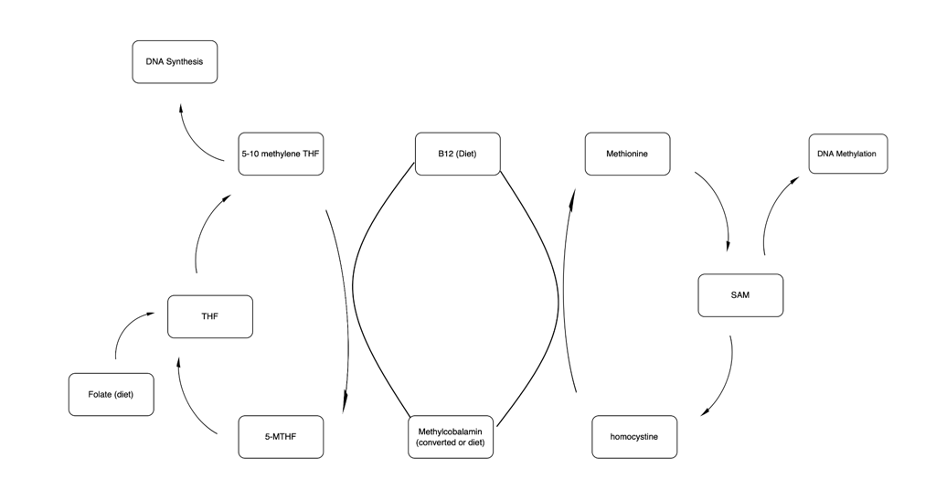
Abstract: B vitamins are water-soluble vitamins that play an important role in energy metabolism, cellular function, and gene expression. Along with a slew of other health outcomes, B vitamins are found to be responsible for modulating the synthesis of DNA and DNA methylation. DNA methylation is a form of regulating gene expression. Broken down, this means it is a process that determines what genes are turned ‘on’ and ‘off’. B vitamins and DNA methylation influence everything from fertility, your health as a mother, birth outcomes, all the way to long-term health and disease risks of your child through adulthood. In particular, B12 and folate depend on each other to maintain various bodily functions. People who exclude animal products are at higher risk for B12 deficiency, and excessive folate may mask a B12 deficiency; therefore, finding balance for B vitamins is essential.
B12 Review: What is B12, And Why Do I Need It?
Cobalamin, commonly known as vitamin B12, is a water-soluble vitamin. This unique vitamin is synthesized by bacteria and is primarily found in animal products. Your body absorbs an estimated 20-70% through diet, mainly in the ileum, and holds tightly to stores in the liver.
Vitamin B12 is required for a process called methylation, which is involved in gene expression, cell differentiation, and organ formation. All of these methylated processes are essential to normal fetal development. Adequate amounts of this crucial vitamin are necessary to alleviate the risk of miscarriage, neural tube defects, and preterm delivery. As the mother’s blood volume rises, the need for new blood cells rises; this process requires more cell division and nutrients to power everything. B12 plays a vital role in this process. B12 and folate work together in the making of new cells.
Methylcobalamin and adenosylcobalamin are metabolically active forms of vitamin B12. Cyanocobalamin, a non-active form, is found readily in prenatal vitamins. It can become activated after it is converted to methylcobalamin within the cell. The conversion process relies heavily on the efficiency of the mother's MTHFR gene, a folate and B12-specific gene readily discussed in the world of pregnancy for its role in miscarriages.
Moreover, B12 deficiency increases methylmalonyl CoA, which is important for fatty acid synthesis. Low B12 through this pathway can influence myelination and lead to neurological problems. Additionally, Vitamin B12 deficiencies can cause irreversible developmental delays, motor problems, and growth issues in infants.
Along with the fundamental concepts listed above, in week 7, we learned.
- Sources and recommended intake for B12 during pregnancy
- Fetal outcomes associated with B12 status
- Symptoms and likelihood of B12 deficiency, including pernicious anemia
- How circulating unmetabolized folic acid masks B12 deficiency (in this post, we will learn why this is critical when talking about DNA expression)
This week we will jump into the nitty-gritty details of B12's role in DNA expression. We will:
- Define key terminology surrounding gene expression as it relates to B12
- Introduce the interplay between B12 and folate for gene expression
- Learn the role of methylation concerning pregnancy, fetal development, and beyond
Terminology
Before we begin, I should preface that this topic is heavy. A variety of key terms will be used throughout this article, so let’s define a few things first:
Epigenetics: Epigenetics is the expression of your genes, whether they are turned ‘on’ or ‘off’. Although your genetic code, DNA, is set for life, when given different conditions, such as diet, environment, sleep, or stress, your body can change the expression of these genes.
DNA Methylation: DNA methylation is a common form of epigenetic modification. The process involves adding a chemical group called a methyl group to the DNA, ultimately affecting gene expression and activity.
Homocysteine: Homocysteine is an amino acid broken down by B12 and folate. Excess homocysteine is toxic to cells and can result in altered DNA methylation and an increased risk of cardiovascular disease and cancer.
Methionine: Methionine is an essential amino acid that is found only through food and is required for DNA methylation. Specifically, it is needed to form S-adenosylmethionine (SAM), a key cofactor of all DNA methylation.
Good-to-know: The nuances of gene expression are much more complicated than using the words ‘on’ and ‘off’; however, these terms are used regularly for general understanding.
The Methyl-Folate Trap
Your body requires enough B12 and folate in balanced proportions to regulate the conversion of homocysteine to methionine. Homocysteine and methionine are both amino acids; methionine is found in your diet, whereas your body produces homocysteine.
B12 deficiency is associated with the dysregulation of DNA synthesis and alters overall methylation patterns. The methyl-folate trap hypothesis explains the physiological processes behind deficient B12 ‘traping’ the methyl group on folate. The trapping of the methyl group then prevents folate from activating DNA methylation.
- First, folate comes in from the diet and is converted to the active form, tetrahydrofolate (THF)
- Next, THF is converted to 5-10 methylene-THF and rearranged to 5-methyl THF. 5-10 methylene-THF is required for DNA synthesis
- Then, 5-methyl THF needs B12 to continue a normal response
- After B12 converts to its active form, methylcobalamin where the conversion of homocysteine to methionine can occur
- Finally, methionine is able to synthesize S-adenosylmethionine (SAM) for DNA methylation, and the cycle continues

Variants of the MTHFR gene are key regulators of this biochemical pathway since this gene is responsible for breaking down folic acid and converting it to a usable form, 5-methyltetrahydrofolate (5-MTHF).
B12, DNA Methylation, And Pregnancy
B12 deficiency can cause changes in fetal DNA methylation, influencing health outcomes for your baby both short-term and long-term. The developing embryo of your baby obtains B vitamins via the placenta and affects DNA methylation patterns for your baby. Additionally, your DNA methylation patterns as the mother can influence cellular processes and in-utero conditions. The changes in methylation passed on from mom to baby are known as transgenerational effects or phenotypes passed on between generations.
Tissue samples have found significant interactions between folate and B12 in the brain, kidney, liver, and placenta genes. This interaction is found in both maternal and fetal tissues. Interestingly, some studies do not observe a significant relationship in the fetus's brain tissue; inconclusive results between studies warrant further research on the topic.
Specific methylated genes can repress the activation of disease on-set, such as breast cancer, cardiovascular disease, diabetes (type 2 and gestational), and neurological dysfunction. However, with elevated homocysteine levels caused by a B vitamin deficiency, there becomes an alteration of gene expression. The significantly high homocysteine levels associated with B12 deficiency are also found to decrease the likelihood of pregnancy and offspring size and increase infant mortality rates.
When you, as the mother, are deficient in these B vitamins, your body and your baby in-utero have mechanisms to try and increase the utilization of the low nutrient. Deficiency for maternal folate and B12 are associated with an increased expression of folate and B12 receptor genes so that the baby’s body can scavenge as much of this nutrient as possible given the low intake from the mother.
Summary
B vitamins are water-soluble vitamins that play an essential role in energy metabolism, cellular function, and gene expression. Along with a slew of other health outcomes, B vitamins are found to be responsible for modulating the synthesis of DNA and DNA methylation.
DNA methylation is a form of regulating gene expression. Broken down, this means it is a process that determines what genes are turned ‘on’ and ‘off’. B vitamins and DNA methylation influence everything from fertility, your health as a mother, birth outcomes, all the way to long-term health and disease risks of your child through adulthood.
In particular, B12 and folate depend on each other to maintain various bodily functions. People who exclude animal products are at higher risk for B12 deficiency, and excessive folate may mask a B12 deficiency; therefore, finding balance for B vitamins is essential.
References:
- Crider KS, Yang TP, Berry RJ, Bailey LB. Folate and DNA methylation: a review of molecular mechanisms and the evidence for folate's role. Adv Nutr. 2012;3(1):21-38. doi:10.3945/an.111.000992
- Mahajan, A., Sapehia, D., Thakur, S. et al. Effect of imbalance in folate and vitamin B12 in maternal/parental diet on global methylation and regulatory miRNAs. Sci Rep 9, 17602 (2019). https://doi.org/10.1038/s41598-019-54070-9
- Monasso, G.S., Küpers, L.K., Jaddoe, V.W.V. et al. Associations of circulating folate, vitamin B12 and homocysteine concentrations in early pregnancy and cord blood with epigenetic gestational age: the Generation R Study. Clin Epigenet 13, 95 (2021). https://doi.org/10.1186/s13148-021-01065-x
- MTHFR gene, folic acid, and preventing neural tube defects. Centers for Disease Control and Prevention. https://www.cdc.gov/ncbddd/folicacid/mthfr-gene-and-folic-acid.html. Published July 6, 2020. Accessed June 25, 2022.
- Office of dietary supplements - vitamin B12. NIH Office of Dietary Supplements. https://ods.od.nih.gov/factsheets/VitaminB12-HealthProfessional/. Accessed June 25, 2022.
- Padmanabhan S, Jost M, Drennan CL, Elías-Arnanz M. A New Facet of Vitamin B12: Gene Regulation by Cobalamin-Based Photoreceptors. Annu Rev Biochem. 2017;86:485-514. doi:10.1146/annurev-biochem-061516-044500
- Zhang N. Role of methionine on epigenetic modification of DNA methylation and gene expression in animals. Anim Nutr. 2018;4(1):11-16. doi:10.1016/j.aninu.2017.08.009